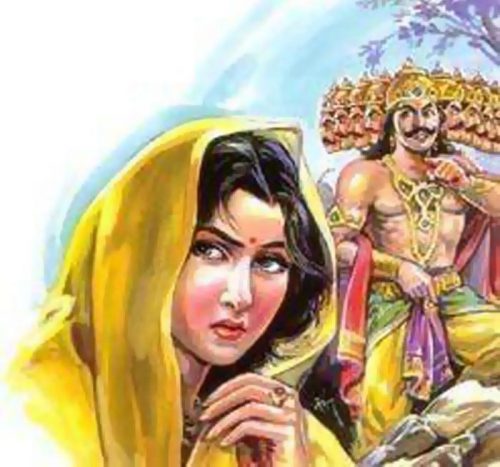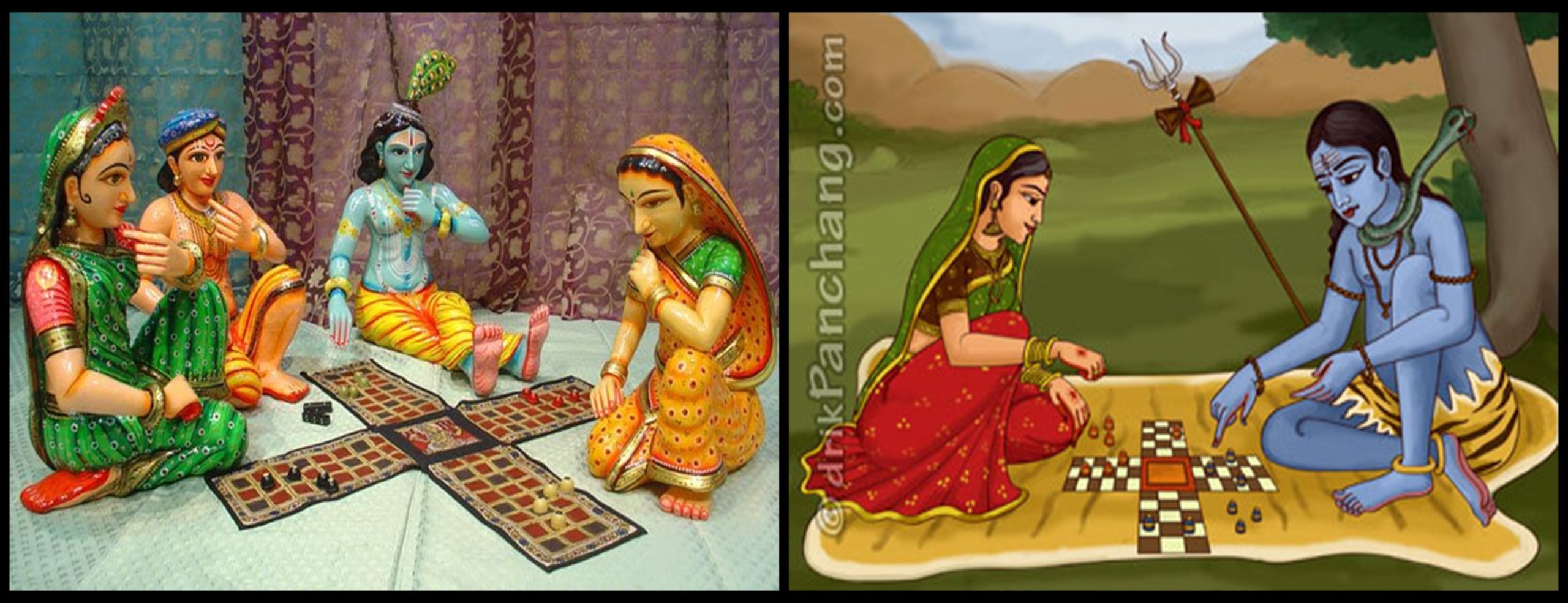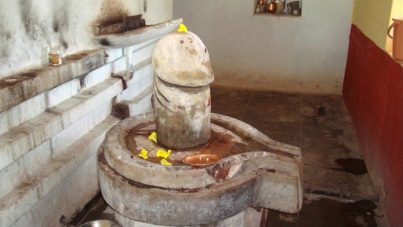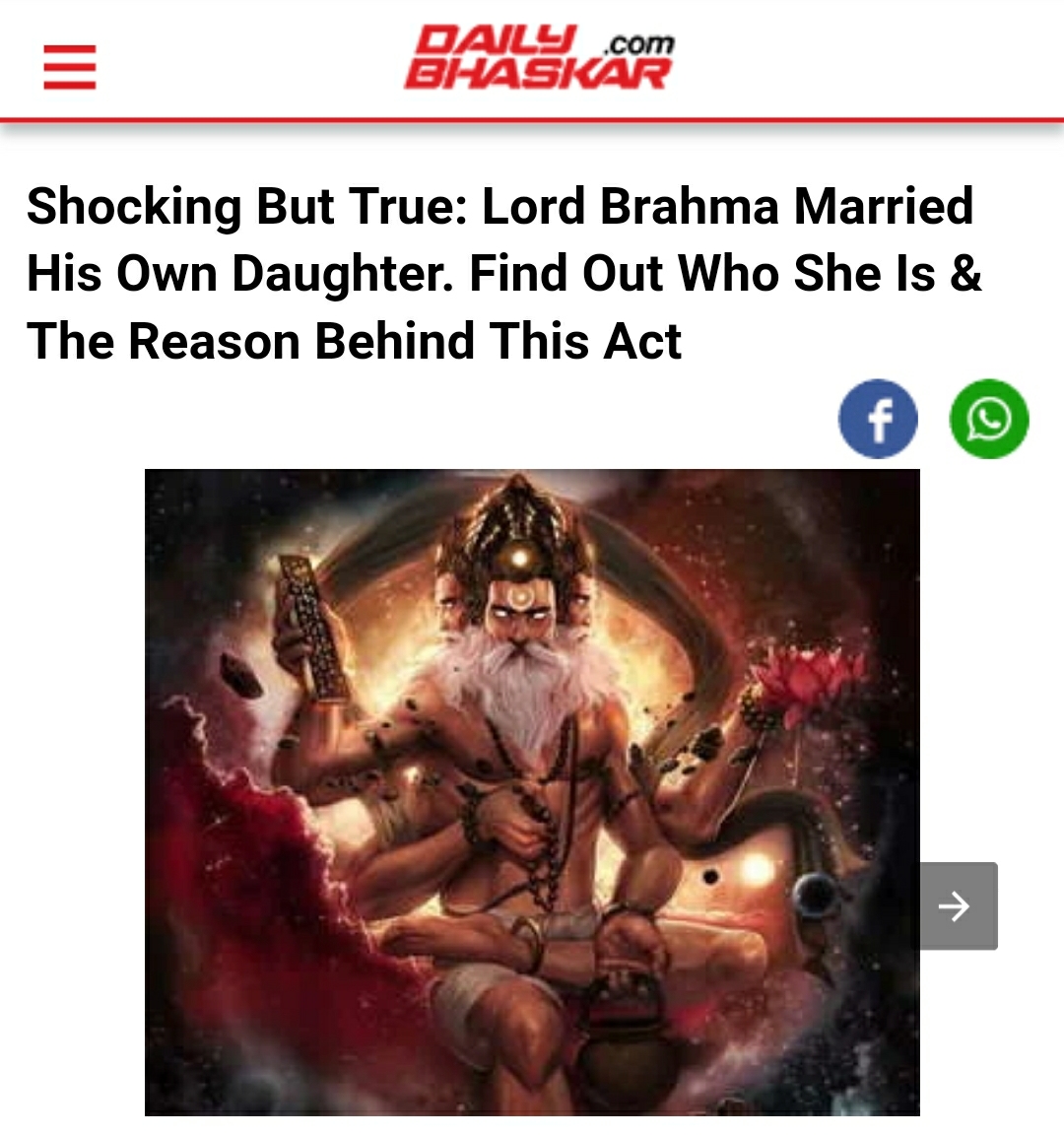Hinduism Exposed Obscenity in Vedas
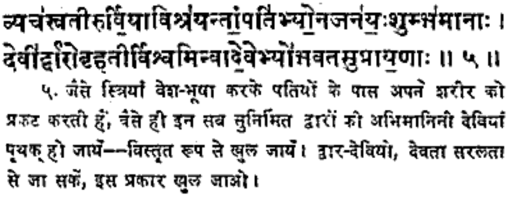
Written by Sulaiman Razvi
Read the new article Hinduism and Lust for obscenity in other Hindu sciptures
This article is not intended to offend Hindus, I have written this article only for those Hindus who thinks only Hinduism is a pure religion free from obscenity and all other religions are full of obscenities. Such people are perverts that’s why they only look for sex related things in other religions, their minds are filled with lust.
Sexuality was not a secret thing in Vedic period as it is evident from Hindu places of worship like Khajuraho, Ajanta, Ellora temples and scriptures like Kama Sutra and various other Hindu texts which openly spoke or showed pornography.
It was only in recent times when Hinduism was influenced by other religions that it took shelter in modesty. Despite such facts some Hindu fanatics do not hesitate mocking other religions especially other religious personalities. I am reproducing some verses from Vedas, which is the oldest text of Hinduism.
SEX POSITIONS IN VEDAS
Rig Veda 10.110.5 Spacious doors remain wide open like beautiful wives for their husbands. O divine doors, great and all-impellers, be easy of access to the gods.

Yaska Acharya explains this verse as
Nirukta 8.10 ”Having spaciousness, make yourself wide open as exceedingly beautiful wives do their thighs for their husbands in sexual intercourse. The thighs are the most beautiful parts (of the body)…” Tr. Lakshman Swarup
The next verse is even more obscene,
Yajur Veda 19.88 ‘‘Just as a wife, the recipient of semen, at the time of cohabitation keeps her head opposite to the head of the husband, and her face opposite to that of his, so should both husband and wife perform together their domestic duties. A husband is a protector like a physician. He lives happily like a child, and with tranquillity produces progeny with penis keen with ardour.” Tr. Devi Chand (Arya Samaj)
Following is the Arya Samaj Hindi translation with commentary
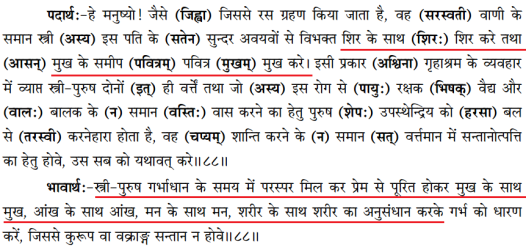
http://aryasamajjamnagar.org/yajurveda/pages/p728.gif
A verse in Atharva reads as follows,
Atharva Veda 14.2.38 “O Men, you are the strengtheners. You inspire into this lady well-wisher of you and your family the spirit of procreating children. This woman is such an entity in whom the men sow semen-seed, who desiring progeny spread her thigh towards her husband and in whom the husband like you and us thrust organ with the desire of children. O happy bride-groom mount over thigh of your wife and touch with hand, in a joyus spirit your wife. You both delighted with joy procreate children…”” Tr. Acharya Vaidyanath Shastri (Arya Samaj)
Another verse reads as,
Atharva Veda 14.2.71 ”O bride, I am Amah and you are Saa I am Saman and you are Rik and I am sun and you earth. Let both of us unite together and procreate progeny.” Tr. Vaidyanath Shastri (Arya Samaj)
As per Brihadaranyaka Upanishad 6.4.20-22 this verse should be recited before sexual intercourse after embracing each other. The passage from Brihadaranyaka Upanishad which is a commentary on this verse also tells a sex position in obscene manner, for more information readers are requested to go through the article Hinduism and Lust
TRANSGENDERISM/HOMOSEXUALITY IN VEDAS
We read in newspaper about some Hindu scholars condemning homosexuality. But do they have any evidence that prohibits homosexuality in Hinduism? Hindu scholars fail to furnish any reference from authoritative text like Vedas which condemns homosexuality but still some try to term homosexuality as irreligious act. Fortunately there are some Hindu scholars like Shri Shri Ravishankar who honestly accept such facts, below are two snapshots of his tweets
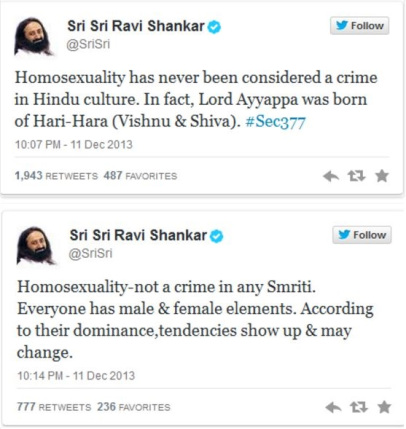
Although we are aware of the homosexual act of Vishnu and Shiva but homosexuality/transgenderism is present in Vedas too. In Veda Indra transformed himself into a woman,
अददा अर्भां महते वचस्यवे कक्षीवते वर्चयामिन्द्र सुन्वते |
मेनाभवो वर्षणश्वस्य सुक्रतो विश्वेत ता ते सवनेषु परवाच्या ||
Rig Veda 1.51.13 To old Kaksivin, Soma-presser, skilled in song, O Indra, thou didst give the youthful Vrcaya. Thou [Indra], very wise, was wife [Mena] of Vrisanaiva; those deeds of thine must all be told at Soma feasts.
Griffith has translated the word Mena as daughter/child but according to Brahmana, Purana and lexicons the word Mena denotes wife, woman, or female of any animal. Griffith wrote, “Mena: according to a later legend, Indra became, himself, the daughter of King Vrishanasva.”
Yaska Acharya gives the following meaning for Mena (also spelled Menah),
![]()
Nirukta 3.21 ”Menah and Gnah are (synonyms) of Women.” Tr. Lakshman Swarup
”मेना Mena – Wife, female”- Cappeller’s Sanskrit English Dictionary
It is also confirmed in Satapatha Brahmana that Indra became the wife of Vrishanasva,
Satapatha Brahmana 3.3.4.18. ‘Come, O Indra!’ Indra is the deity of the sacrifice: therefore he says, ‘Come, O Indra!’ ‘Come, O lord of the bay steeds! Ram of Medhatithi ! Wife of Vrishanasva ! Bestriding buffalo! Lover of Ahalya’ Thereby he wishes him joy in those affairs of his.
Baudhayana Srauta Sutra XIX.10 “…Indra, do thou come. Thou with the tawny seeds come, Ram of Medhatithi. Mena of Vrsanasva. Buffalo leaping down. Lover of Ahalya. Brahmana of Kusika’s clan. Thou that callest thyself Gautama…” Tr. C.G. Kashikar
Maitrayani Samhita 2.5.5 ”When Indra became Vrishanasva’s Mena [or wife] he was seized by Nirrti, Calamity. When he chased it away, that Calamity became a castrated animal. Whoever thinks he is seized by Calamity, Darkness, he should sacrifice this castrated animal to Indra.”-Tr. Feller.
Indra is considered the wife of Vrishanasva in Satapatha Brahama, as we all know Indra lusted after Ahalya thus he is also called the lover of Ahalya in the Satapatha Brahmana. From major sources like Satapatha Brahmana, Baudhayana Srauta Sutra, and Maitrayani it is proved that Indra indeed became the wife of Vrishnasva. Another transgender story is mentioned in the Atharva Veda where Indra assumed the form of a woman to have sex with an Asuri named Vilistenga.
Atharva Veda 7.38.2 This Herb wherewith the Asuri drew Indra downward from the Gods, With this same Herb I draw thee close that I may be most dear to thee.
Kathaka Samhita 13.5 “Indra desired the Danavi Vilistenga. He went to the Asuras and became a woman among women and a man among men. He thought he was seized by Nirrti (the goddess of Calamity or Misfortune). He saw (as a sacrificial offering) this castrated animal consecrated to Indra and to Nirrti. In that form in which he went about (i.e. castrated), such an animal he offered in sacrifice.” Tr. Danielle Feller
This story is further elaborated in Brhaddevata. According to Shaunaka Rishi, Indra after transforming himself into a woman had sex with a Danavi which can be considered Lesbianism.
Brhaddevata VI.76-76 “In ‘Downward’ (adhah: viii.33.19) a girl addressed Indra (who appeared) with the characteristics of a woman’ for the chastiser of Paka (Indra) made love to that Danava maiden, the eldest sister of Vyamsa, by reason of his (Indra’s youthful desire (yuva-kamya)…” Tr. Arthur Anthony Macdonnel
Arthur Anthony Macdonnel wrote in the footnotes,
“That is, this stanza is addressed by a Danavi to Indra who has assumed the form of a woman. According to Sayana on RV. viii.33.19 this stanza is addressed to Asanga Playogi when he was a woman (cp. above, vi.41). And has assumed the disguise of a woman because Vyamsa was his enemy.”
There is another transgender story mentioned in Rig Veda which says that Asanga son of Playoga had become a woman after he was cursed by gods,
Rig Veda 8.33.19 Cast down thine eyes and look not up. More closely set thy feet. Let none See what thy garment veils, for thou, a Brahman, hast become a dame.

This is elaborated in later texts as,
Brhaddevata of Shaunaka VI.41 “The seer turned that Asanga, who had been a woman, into a man (again)…” Tr. Arthur Anthony Macdonnel
Sankhayana Srauta Sutra XVI.11.16-18 “The sixth is that relating to Medhatithi, how Asanga, the son of Plyoga, being a woman became a man…” Tr. W. Caland
Rape
There’s a verse in Rig Veda which reads as,
यः सत्राहा विचर्षणिरिन्द्रं तं हूमहे वयम |
सहस्रमुष्क तुविन्र्म्ण सत्पते भवा समत्सु नो वर्धे ||
yaḥ satrāhā vicarṣaṇirindraṃ taṃ hūmahe vayam |
sahasramuṣka tuvinṛmṇa satpate bhavā samatsu no vṛdhe ||
Rig Veda 6.46.3 “We invoke that Indra who is the destroyer of mighty foes, the supervisor (of all things): do thou, the many-organed, the protector of the good, the distributor of wealth, be unto us (the insurer of) success in combats.” Tr. H.H. Wilson
The Sanskrit word mentioned here to describe Indra is Sahastra+Mushka which means thousand vaginas/testicles. Some translators including Griffith has translated this word as “thousand powers” but I do not agree with it since the word Mushka ( मुष्क ) clearly means Vagina/Testicles, Mushka here definitely means vagina because there is evidence from other Hindu text to support “thousand vagina” definition. Whether the word Mushka means Vagina or testicle is not an issue but a Vedic god described as being with “A Thousand Testicles” in holy scripture is surely obscene. One can check the meaning of Mushka ( मुष्क ) in V.S Apte’s dictionary available online uchicago.edu and also from another online dictionary Spokensanskrit.de. The story as mentioned in Skanda Purana V.iii.136.2-16; Brahma Purana, Gautami-Mahatmya 16.59 states that Indra was cursed by Sage Gautama to be with one thousand Vaginas all over the body as Indra had raped Sage Gautam’s wife Ahalya which I have explained briefly in Hinduism and Lust article. Sayana interprets the word Sahasra Mushka as Sahasra-Shepha (thousand penises),

Maharshi Yaska mentions a strange story about the birth of Asvins (the twin horsemen). Which is a elaboration of Rig Veda Mandal 10, hymn 17. The story says Saranyu was unwilling to have sex with Vivasvat and ran away but Vivasvat chased her and raped her. Yaska writes,
Nirukta 12.10 ”Saranyu daughter of Tvastr bore twins, Yama and Yami, to Vivasvat the sun. She having substituted another lady of similar appearance, and having assumed the shape of a mare, ran away. He, Vivasvat, the sun, having also assumed the shape of a horse, pursued her, and joined her. Thence the Asvins were born. Manu was born from the lady of similar appearance.” Tr. Lakshman Swarup
This story of Vivasvat raping his wife by inserting penis in her mouth is further elaborated in Brahma Purana 4.42-43; Shiva Purana, UmaSamhita 5.35.32-34; Matsya Purana 11.34-37 and Brahmanda Purana 2.3.59.74-76 which I have mentioned in Hinduism and Lust article under Oral Sex category. The question is how sun god was aroused seeing his wife who was in the form of a mare? It must have been that Vedic god Vivaswat was sexually attracted towards animals that’s the reason he raped his wife whilst she was in the form of a mare. But Vedas also has mention of bestiality.
SEX WITH ANIMALS
Some protestant Hindus proudly promote Vedas as philosophical, free from all vulgarities. But in reality there is no limit for Vulgarity in Vedas. It even promotes sex with animals let alone adultery and pornography. Sex with animals in Hinduism is not a vulgar thing, Ancient Hindu temples like Khajuraho, Ajanta, Ellora clearly depicts men and girls having sex with animals.
ASHVAMEDHA YAJNA
Read the article Ashvamedha Yajna The Obscene for more evidence
Ashvamedha Yajna is a ritual performed by Queens (particularly by chief queen) for fertility and also to gain power in the kingdom. The Ashvamedha Yajna includes slaughtering the horse, then follows the obscene Queen’s intercourse with the horse, then the horse is cut into pieces and cooked. However some Hindus due to extreme obscenity reject these facts and are giving their personal interpretations. They even deny the fact that Horse was slaughtered during the ritual, I request the readers to go through the article Meat Consumption in Hinduism.
It is mentioned both in Krishna and Yajur Veda, but the this sacrifice mentioned in Krishna Yajur Veda is obscure because the author has omitted those verses,
Krishna Yajur Veda 7.4.19 The wicked horse is sleeping. O fair one, clad in fair raiment in the world of heaven be ye two covered ….{…several verses omitted from original translation…} Sacred-texts.com
It is mentioned in Shukla Yajur Veda,
Yajur Veda 23.19-21 All wife of the host reciting three mantras go round the horse. While praying, they say: ‘O horse, you are, protector of the community on the basis of good qualities, you are, protector or treasure of happiness. O horse, you become my husband’. After the animal is purified by the priest, the principal wife sleeps near the horse and says: ‘O Horse, I extract the semen worth conception and you release the semen worth conception. The horse and principal wife spread two legs each. Then the Ardhvaryu(priest) orders to cover the oblation place, raise canopy etc. After this, the principal wife of the host pulls penis of the horse and puts it in her vagina and says: “This horse may release semen in me. Then the host, while praying to the horse says: “O horse, please throw semen on the upper part of the anus of my wife. Expand your penis and insert it in the vagina because after insertion, this penis makes women happy and lively.
LICENTIOUS ACT OF VEDIC GODS
Rig Veda 7.33.11 Born of their love for Urvasi, Vasistha thou, priest, art son of Varuna and Mitra; And as a fallen drop, in heavenly fervour, all the Gods laid thee on a lotus-blossorn.
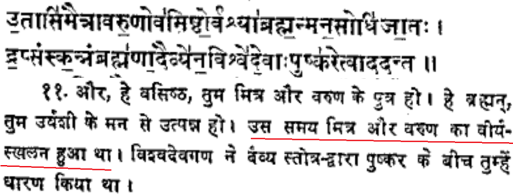
Above is Pundit Ram Govind Trivedi’s Hindi translation. Yaska Acharya writes on this verse,
Nirukta 5.13 “Urvashi is (the name of) a naiad, (so called because) she pervades wide regions (uru + as- to pervade ‘), or she pervades by means of thighs [Sexual Intercourse] …On seeing her, the seminal fluid of Mitra and Varuna fell down. Tr. Lakshman Swarup
It is mentioned in Bhagwad Purana/Srimad Bhagavatam (ISKCON translation)
Bhagavad Purana (Srimad Bhagavatam) 6.18.6 Upon seeing Urvaśī, the celestial society girl, both Mitra and Varuṇa discharged semen, which they preserved in an earthen pot. The two sons Agastya and Vasiṣṭha later appeared from that pot, and they are therefore the common sons of Mitra and Varuṇa. Mitra begot three sons in the womb of his wife, whose name was Revatī. Their names were Utsarga, Ariṣṭa and Pippala.
Bhagavad Purana (Srimad Bhagavatam) 9.13.6 After saying this, Mahārāja Nimi, who was expert in the science of spiritual knowledge, gave up his body. Vasiṣṭha, the great-grandfather, gave up his body also, but through the semen discharged by Mitra and Varuṇa when they saw Urvaśī, he was born again.
Brhaddevata V.149-150 “Of these two Adityas, when they saw the nymph Urvasi at a sacrificial session, the semen was effused. It fell into a jar containing water that stood overnight. Now at the same moment two vigorous ascetics, the seers Agastya and Vasistha, there came into being.” Tr. Arthu Anthony Macdonnel
VEDIC GODS HAVING SEX WITH THE SAME WOMAN AND IMPREGNATING HER
”Pushan, inspire her who is most auspicious, in whom men may sow seed, who most affectionate. may be devoted to us, and in whom animated by desire we may beget progeny. (The Gandharvas) gave Surya to thee, Agni, with her bridal ornaments ; do thou, Agni, give (us) husbands our wife back again with male offspring. Agni gave the wife back again with life and splendour; may he who is her husband enjoying long life live a hundred years. Soma first obtained the bride;the Gandharva obtained her next ; Agni was thy third husband ; thy fourth (husband) is born of man. Soma gave her to the Gandharva; the Gandharva gave her to Agni ; Agni has given her to me and wealth and sons.” Rig Veda 10.85.37-41, Tr. Wilson [See below for Arya Samaj translation]
This is also mentioned in Atharva Veda,
Atharva Veda 14.2.3-4 She was the wife of Soma first: next the Gandharva was thy lord. Agni was the third husband: now one born of woman is thy fourth. Soma to the Gandharva, and to Agni the Gandharva gave. Now, Agni hath bestowed on me riches and sons and this my bride.
It is mentioned in Agni Purana,
Agni Purana 165.19-20 ”The gods first enjoy the women, then the Moon-god, after them the Gandharvas, subsequently the Fire-god, and last of all the mortals; and hence they can never be polluted.” Tr. M.N. Dutt
Atri Samhita 1.190 “Women were first enjoyed by the Celestials; then by the moon, the Gandharvas and the Fires. Afterwards came men to enjoy them. They are never affected by any sin.” Tr. Manmatha Nath Dutt
Arya Samaji scholar named Vaidyanath Shastri tries to link 4th verse of Atharved to Niyoga, another scholar named Kshemkarandas Trivedi explains 4th verse in terms of Niyoga, Another proof is that Swami Dayanand Saraswati had also used a verse from the same hymn, He used Atharva Veda 14.2.18 as well as verses from Rig Veda 10.85 hymn as evidence for Niyoga. Pandit Jaydev Sharma endorsed Dayanand Saraswati’s views and commenting on 4th verse he makes a mention of the passage written by Dayanand. Swami Dayanand Saraswati wrote,
‘’A. ~ “O woman! Thy first husband with whom thou art united by marriage is named Soma, called so because he was a chaste bachelor (before marriage). Thy second husband with whom thou art connected by Niyoga is named Gaandharva, called so because he had already lived with another woman (to whom he had been united by marriage). Thy third husband, (by Niyoga) is named Agni (fire), called so because he so very passionate. All thy other husbands from the fourth to the eleventh are called men.’’ Satyarth Prakash, Ch 4, p.136, by Swami Dayanand Saraswati, Tr. Chiranjiva Bhardwaja.
The fact that Arya Samaj scholars are trying to link these verses to Niyoga proves that sex is involved hence also proves that Vedic deities had sex with the same woman and impregnated her. Still some people may regard this as allegorical to escape but explanation from Agni Purana and Swami Dayanand is enough to prove the point. This verse can also be used to prove Polyandry. They try their level best to hide these vulgar things, example is the passage by Dayanand who tries to turn the names of Vedic deities to normal men. The verses I quoted above are perhaps not related to Niyoga but Dayanand Saraswati tries to justify the filthy act of gods by linking it to Niyoga (Which is also a filth).
ADULTERY AND PROSTITUTION IN VEDA
Swami Parmeshwaranand writes
”Jara [Lover] is always explained as Upapati (paramour) by Sayana. There is hardly any reference in the Rig Veda which might suggest that a lover was looked down upon or was considered morally wrong or corrupt. Sayana also does not consider loving sinful.”
As Swami Parmeshwaranand said Jara, which is translated as Lover, Paramour and Gallant wasn’t considered wrong, in fact Vedas promotes adultery, Maharishi Manu writes,
Manu Smriti 5.56 There is no sin in eating meat, in (drinking) spirituous liquor, and in carnal intercourse, for that is the natural way of created beings, but abstention brings great rewards
Rig Veda mentions story of Apala the daughter of Atri who suffered from skin-disease. She was married but her husband had left her. Indra was attracted to her, she chewed Soma plant which was then drunk by Indra from her mouth. To cure her, Indra dragged her through the wide hole of his chariot, the narrower hole of the cart, and the small hole of the yoke, and she cast off three skins. The first skin became a hedgehog, the second an alligator, and the third a chameleon.
Rig Veda 8.80.1-7 “A young woman going to the water found Soma in the path; as she carried it home she said, I will press thee for Indra, I will press thee for Sakra. Thou who goest from house to house a hero bright in thy splendour, drink this Soma pressed by my teeth, together with fried grains of barley, the karambha, cakes, and hymns…May (Indra) repeatedly make us powerful, may he do abundantly for us, may he repeatedly make us very rich; often hated by our husband and forced to leave him, may we be united to Indra. These three places, do thou cause them all to grow, my father’s (bald) head, his (barren) field, and my body. This field which is our (father’s), and this my body, and the head of my father, do thou make all these bear a crop. Thrice, Satakratu, didst thou purify Apala, in the hole of the chariot, in the hole of the cart, and in the hole of the yoke, and thou didst make her with a skin resplendent like the sun.” Tr. H.H. Wilson
Shaunaka wrote on these verses,
Brhaddevata VI.99-106 “There was once a girl Apala, daughter of Atri, who suffered from skin-disease. With her Indra fell in love, having seen her in the lonely hermitage of her father. Now by penance she became aware of all Indra’s intentions. Taking a water-pot she went to fetch water. Seeing Soma at the edge of the water, she praised him with a stanza in the forest. This matter is related in the (stanza) ‘A maiden to the water’ (kanya vah: viii.91.1). She pressed Soma in her mouth: and having pressed it she invoked Indra with the (stanza), ‘Thou that goest’ (asau ya esi: viii.91.2); and Indra drank it from her mouth, after he had eaten cakes and meal from her house. And she praised him with stanzas, but with a triplet (viii.91.4-6) she addressed him (saying), ‘Make me, O Sakraa, to have abundant hair, (and) to be faultless-limbed, (and) fair-skinned.’ Indra passing (praksipya) her through the carriage aperture (between the body of the car and the yoke, drew her forth three times. Then she became fair-skinned. Her first skin which was cast off became a porcupine (salyaka), but the next became an alligator (godha), and the last a chameleon (krkalasa).” Tr. Arthu Anthony Macdonnel
There are numerous verses which praises adultery,
Atharva Veda 5.5.3 Thou clingest close to every tree, as a fond damsel clasps her love.

Rig Veda 3.52.3 ”Relish, O illustrious Lord, our delicious roasted corn and butter. Derive enjoyment from our praises, as a lover from his beloved.” Tr. SatyaPrakash Saraswati (Arya Samaj)
Wilson’s translation for this verse,
”Eat, Indra, our (offered) cakes and butter; derive enjoyment from our praises, as a lover from his mistress.”
Rig Veda 1.134.3 ”…O Vayu, come and wake up and energise life like a lover who wakes up and impassions a sleeping beauty…” Tr. Tulsi Ram (Arya Samaj)
Rig Veda 3.33.10 Yea, we will listen to thy words, O singer. With wain and car from far away thou comest. Low, like a nursing mother, will I bend me, and yield me as a maiden to her lover.
Maharishi Yaska writes,
Nirukta 2.27 “We bend down for thy sake, as a nursing mother for her son, or as a maiden bends herself to embrace her lover.” Tr. Lakshman Swarup
Verses from Rig Veda 6.75.4, 9.96.23 and 9.101.14 likens the meeting of lovers to Hindu gods, But what’s more interesting is that the Vedic heroes are considered Maiden’s lovers. However Agni being maiden’s lover is regarded by some as allegorical, but still this doesn’t disapprove the existence of illicit relationship and it promotes adultery,
Rig Veda 1.66.4 Yama, indeed, is what is born, Yama, what shall be born; he [Agni] is the maidens’ lover, the matrons’ lord.
सेनेव सर्ष्टामं दधात्यस्तुर्न दिद्युत तवेषप्रतीका |
यमो ह जातो यमो जनित्वं जारः कनीनां पतिर्जनीनाम ||
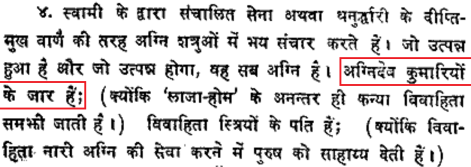
These verses clearly shows that adultery wasn’t deemed morally wrong, this is why there are numerous verses praising adultery but no where prohibits it. Prostitution was also prevalent in the Vedic period. It is still prevalent in some temples especially in south India where girls are forced to become Devdasi. Devdasi actually means slave or servant of god but they are sexually tortured by the Brahmins, these licentious priests sanction Sacred Prostitution, which is also known as Temple prostitution. However looking in the Vedas one can find the origins of prostitution.

Rig Veda 1.167.4 Far off the brilliant, never-weary Maruts cling to the Sadharani as a joint possession…
The Sanskrit word used here is Sadharani (after separating the words) referring to common woman, public woman or prostitute.
“Sadharani or Samanya (common), synonyms for prostitute, distinguish her as a woman possessed by not one man; this is the desideratum”- (Bhattacharji 1987, 33). [Source]
Monier Williams translates it as ”Common to all”. Wilson also translates it as common woman or it may also be referring to a common wife like Draupadi.
Temple prostitution or sacred prostitution is still prevalent in many parts of India,
As per Theguardian.com’s 2011 report “The National Commission for Women estimate that there are 48,358 Devadasis currently in India.”
http://www.theguardian.com/lifeandstyle/2011/jan/21/devadasi-india-sex-work-religion
And as per TheHindu.com
Quoting the National Commission for Women, the authority says there are 2.5 lakh “Devadasi” girls who have been dedicated to Yellamma and Khandoba temples on Maharastra-Karnataka border. This includes 16,624 from Andhra Pradesh, 22,941 from Karnataka and 2,479 from Maharastra. The Devadasi system is prevalent in 10 districts of north Karnataka and 14 districts in Andhra Pradesh.
http://www.thehindu.com/todays-paper/tp-national/tp-karnataka/article3246913.ece
http://www.telegraph.co.uk/expat/expatlife/8008562/Indias-prostitutes-of-God.html
According to the report published in 2015, there are 80,000 Devdasi in Telangana and Andhra Pradesh states.
http://timesofindia.indiatimes.com/india/Devadasi-system-still-exists-in-Telangana-AP-says-report/articleshow/46337859.cms
As per Vedas everyone is born with a destined profession including prostitution based on their past deeds, it is mentioned that
Yajur Veda 30.5 ”For Brahman (Priesthood) he binds a Brahman to the stake… for Kama [Sex] a harlot…”
Some people try to explain this verse by misquoting it, they translate it as,
” May the Lord (of world as well as country) give due reward or punishment to various people – Brahmin for promotion of wisdom…”
I am reproducing two Hindi translations by Shri Ram Sharma Acharya and Swami Karpatri Maharaj

Swami Karpatri Maharaj’s Hindi translation

Word by Word translation,
Brahmane Brahmanam = For priesthood (he binds) a Brahmin.
Kshatriya Rayanam = For a Kshatriya Rajanya (Kingdom, Governance).
Tapse Shudram = For penance a Shudra.
Tamse taskaram = For darkness a robber.
Narkaya Virhanam = For hell a homicide.
Paapmane Klibam = For misfortune/Sin a eunuch.
Akrayayo Ayogum = For venality a Ayogu
Kamaya Punscalum = For desire a Harlot
Atikrushtaya Magadham = For excessive noise a Magadha
The writer can do us a favor by quoting the Sanskrit words which he translated as ”May the lord give due reward or punishment to various people”. Some also try to explain it by adding these two words ”Cast aside” before harlot, I request them too to show which Sanskrit words are translated into ”Cast aside”. Those Hindus are leaving an example of how religious scripture undergoes corruption, they are adding their own words. That verse doesn’t have any Sanskrit words which can be translated as ”may lord give reward or punishment” or ”Cast aside”. Now they may argue that it is mentioned in Yajur Veda 30.3 and this verse is in continuity. If it so then why didn’t they mention it before? First of all if the verse is in continuity then why is the 4th verse omitted, Why have they jumped from 3rd to 5th verse when they claim that Vedas were arranged chronologically. Does that mean Rishis made a blunder in arranging these verses here? Moreover the deities of verses 3 and 5 are different so how can it be in continuity? The 3rd verse doesn’t state anything like ”May the lord give due reward or punishment”, it says
Yajur Veda 30.3 Savitar, God, send far away all troubles and calamities [from us], And send us only what is good.

It is mentioned in the same chapter of Yajur Veda,
Yajur Veda 30.9 For Rendezvous a lover; for Homestead a paramour…
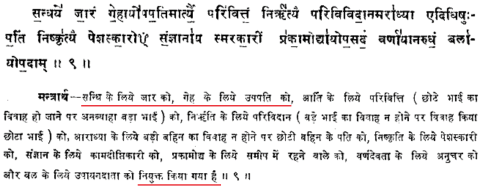
It is further mentioned
Yajur Veda 30.20 For Pastime a harlot; for Laughter a jester; for Lust a woman with spotty skin…

It may not be a sin to become prostitute as Ishwar himself has assigned these professions to humans. There is no free will to choose the profession you desire, For Brahman Ishwar binds priesthood and for prostitutes he binds Kama (lust, desire, sexuality), Ishwar even says that he has created Woman for Lust. How can we consider Ishwar to be God after reading such verses. Is women created for mere sexual enjoyment in Vedas? Yaska Acharya also writes in his book,
Nirukta 4.15 “Kanya (maiden) is (so called because) she is an object of love…” Tr. Lakshman Swarup
Look at the phrase used here ”Object of love”, which clearly implies that Women in Hinduism is nothing more than a Sex object.
Sex Slaves
Rig Veda 6.27.8 Two wagon-teams, with damsels, twenty oxen, O Agni, Abhydvartin Cayamana, The liberal Sovran, giveth me. This guerdon of Prthu’s seed is hard to win from others.

another Hindi translation,
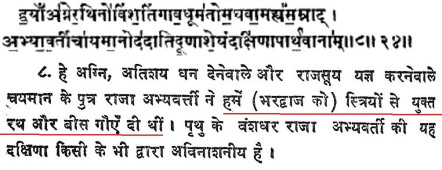
These female slaves were given after a battle. This was a battle between Vedic god and Asuras, read previous verses for more information.
Women in Paradise
Ishwar has arranged thousands of Virgins for Brahmins not just on the earth but in the paradise too,
Atharva Veda 4.34.2 ”The persons firm in their faith, purified, cleansed with their sacerdotal acts and pure in their conscience attain the state of splendid purity. The all-pervading Divinity does not burn or deprive of their organ of enjoyment and generation and in the state of Svarga they have many women, one for each one as his wife.” Tr Vaidyanath Shastri (Arya Samaj)

There is no word after Strenaam, but Vaidyanath Shastri tries to create monogamy in heaven by adding his own words ”one for each one as his wife”. But Panini in Ashtadhyayi 4.1.87 has interpreted the word Strenaam as ‘Collection of Females’, so in heaven they get plenty of women not just one woman or wife (as claimed by Vaidyanath) which is evident from the Hindi translation by Shri Ram Sharma Acharya also. Another Hindu scholar named M.R. Rajesh translates it as,
Atharva Veda 4.34.2 ”Bereft of physical bodies, pure, cleansed with the wind, brilliant, they go to a brilliant world. The fire does not cause burning in their male organ. In the world of happiness they get plenty of women.” Tr. M.R. Rajesh
NIYOG PRATHA
Niyog Pratha is the ugly practice where the wife copulates with other men to beget children, it is also a license for Brahmins to enjoy numerous women as Vedic law permits them to copulate with any women they desire if they are unable to control their passion. Following verse is taken as a proof for Niyoga from the Vedas,
Rig Veda 10.40.2 Where are ye, Aśvins, in the evening, where at morn? Where is your haltingplace, where rest ye for the night? Who brings you homeward, as the widow bedward draws her husband’s brother, as the bride attracts the groom?
Yaska explains this verse as,
Nirukta 3.15 ”Where do you remain at night, and where during the day? Where do you obtain the necessities of life, and where do you dwell? Who puts you to bed as a widow her husband’s brother? From what (root) is Devara derived ? (He is)so called (because) he is the second husband…” Tr. Lakshman Swarup
The one who is to contract Niyoga with the widow is known as Appointed Husband or Devar. The brother of the deceased is most preferred in the case of Niyoga, after that Sapinda (Close relatives) and Niyoga with high caste Brahmins is also preferable as a widow can’t contract Niyoga with lower caste. It is recommended to contract Niyoga with higher caste men only as they are said to be so called ‘Intellectuals’. Above verse from Vedas as well as Nirukta talks about Niyoga. Arya Samaji scholar named Chiranjiva Bhardvaja explains the word Devar (in Niyoga sense) in the amendment of his translation in the 4th chapter of Satyarth Prakash,
”*Q. ~ Supposing the deceased husband of a widow had no younger brother, with whom should she contract Niyoga?
A. ~ With her devar, but the word devar does not mean what you think. For the Nirukta says “The second husband by Niyoga of a widow, be he the younger brother of her deceased husband or his elder brother, or of a man of her won Class or of a higher Class, is called Devar.” explanation by Dr. Chiranjiva Bhardwaja, page 134, Ch 4, Satyarth Prakash.
Some Hindus especially Aryas are shying away from this topic and even defying their guru Swami Dayanand Saraswati (Mulshankar) who immensely supported Niyoga. Stalwarts of Arya Samaj viewed Niyoga as legit and that it is sanctioned by the Vedas. Rig Veda hymn 10 of chapter 10 endorses Niyoga (as per Arya Samaj translation), Following is the snapshot of the header from their website
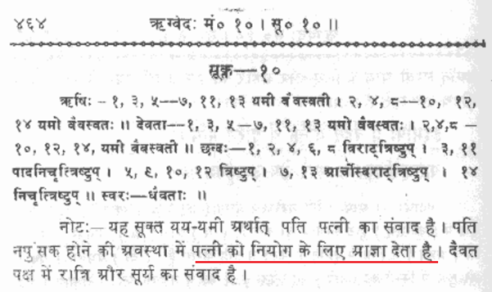
It states,
”This hymn is a dialogue between Yama and Yami i.e. between husband and wife. The husband on being impotent allows his wife to contract Niyoga…” [Source: http://aryasamajjamnagar.org/rugveda_v5/pages/p464.gif ]
It is mentioned in Rigved,
Rig Veda 10.40.2 ”O man and woman (connected by Niyoga), just as a widow, cohabits with her husband by Niyoga and produces children for him, and a wife cohabits with her husband by marriage and produces children for him, likewise (it may be asked) where both of you were during the day and during the night, and where you slept, who you are, and what your native place is.” taken from the book Satyarth Prakash, Ch 4, p.134, Tr. Chiranjiva Bhardwaj (Arya Samaj)
Atharva Veda 14.2.18 “Do thou O woman that givest no pain to thy husband or Devar (husband by Niyoga), art kind to animals in this Order of householders, walk assiduously in the path of righteousness and justice, art well-versed in all the Shastras, hast children and grandchildren, givest birth to valiant the brave boys, desirest a second husband (by Niyoga), and bestoweth happiness on all, accept a man of they choice as thy husband or Devar , and always perform the Homa which is the duty of every householder.” taken from the book Satyarth Prakash, Ch 4, p.135, Tr. Chiranjiva Bhardwaja (Arya Samaj),
What’s more uglier is that Rishis created this practice to legitimize their desire. It enables a Brahmin to have sex with numerous women. Mulshankar (Dayanand) writes in his book,
”Those, however, who cannot control their passions may beget children by having recourse to Niyoga”- Satyarth Prakash, by Swami Dayanand Saraswati, Ch 4, page 130, Tr. Chiranjiva Bhardwaja.
For more evidence of Niyoga from other Hindu scriptures read the article Hinduism and Lust.
BRIDE SELLING IN VEDA
When the bridegroom was crippled, mentally unstable or lacked qualification then he purchased the bride from father with huge amount,
Rig Veda 1.109.2 “O Indra and Agni (Electricity and fire or father and Acharya) I have heard that you are more munificent givers than an un-worthy son-in-law or the brother of the bride…” Tr. Acharya Dharma Deva Vidya Martanda (Arya Samaj)
Nirukta 6.9 “I have heard that you are more liberal indeed than a would be son-in-law, i.e. one whose son-in-lawship is not quite complete. It is well known that the people in the south apply the term vijamata to the husband of a purchased maiden. By this is meant a bridegroom, whose relationship is not complete as it were…” Tr. Lakshman Sarup
This type of marriage is permissible in later texts where it is known as Asura/Manusha form of marriage. Refer the article Hinduism and Lust for more information.
INCEST IN VEDAS
Rig Veda 6.55.4 Pushan, who driveth goats for steeds, the strong and Mighty, who is called His Sister’s lover, will we laud.
Yaska Acharya explains this as,
Nirukta 3.16 ”The author calls dawn his sister, from companionship, or drawing the juices. Or else this human lover may have been meant; the enjoyment in that case will refer to the woman, derived from (the root) bhaj (to enjoy)” Tr. Lakshman Swarup
Nowadays some defensive Hindus try to turn every obscene verse into metaphor to find a easy route to escape, but according to Yaska Acharya this refers to a human lover. Agni is also described as his sister’s lover,
Rig Veda 10.3.3 ”Attendant on the Blessed Dame the Blessed hath come: the Lover followeth his Sister. Agni, far-spreading with conspicuous lustre…”
Leave aside brother sister relationship, Vedas even promote Son-Mother incest,
Rig Veda 6.55.5 ”I glorify Pushan, the husband of his mother:may the gallant of his sister hear us ; may the brother of Indra be our friend.” Tr. Wilson
As we have already seen, it talks about a human lover (Nirukta 3.16). Vedas speak of brother sister’s incest in several hymns including the Rig Veda 10.10 and Atharva Veda 18.1.8 which is a dialogue between Yama and Yami. But I find no reference of Ishwar prohibiting it. Yami in Rigved 10.10.5; Atharved 18.1.5 says that Tvashtar made them husband and wife in the womb of their mothers only, though Yama rebukes her saying it has not been done before. Veda also allows incest between father and daughter, it is mentioned in Rig Veda
Rig Veda 10.61.5-7 “(Rudra), the benefactor of man, whose eager virile energy was developed, drew it back when disseminated (for the generation of offspring)again the irresistible (Rudra) concentrates (the energy) which was communicated to his maiden daughter. When the deed was done in mid-heaven in the proximity of the father working his will, and the daughter coming together, they let the seed fall slightly; it was poured upon the high place of sacrifice. When the father united with the daughter, then associating with the earth, he sprinkled it with the effusion[Semen]: then the thoughtful gods begot Brahma : they fabricated the lord of the hearth (of sacrifice) ; the defender of sacred rites.” Tr. H.H. Wilson
Following Hindi translation is by Pandit Ram Govind Trivedi
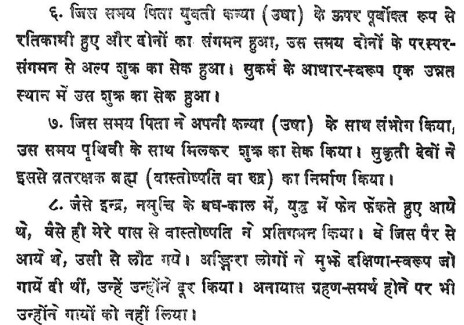
Some scholars say Rig Veda 10.61.5-7 verses are about the creation of universe after the union of father with his daughter. This is supported by Brihadaranyaka Upanishad, Upanishad also permits sex with daughter, its mentioned in Brihadaranyaka Upanishad that men were born after God had intercourse with his daughter,
Birhadaranyaka Upanishad 1.4.3 ”He was not at all happy. Therefore people (still) are not happy when alone. He desired a mate. He became as big as man and wife embracing each other. He parted this very body into two. From that came husband and wife. Therefore, said Yajnavalkya, this (body) is one-half of oneself, like one of the two halves of a split pea. Therefore this space is indeed filled by the wife. He was united with her. From that men were born.” Tr. Swami Madhavananda
AdiShankara Acharya writes on this verse,
‘’He, the Viraj called Manu, was united with her, his daughter called Satarupa, whom he conceived of as his wife. From that union men were born.’’ by Shankara on Brihadaranyaka Upanishad 1.4.3, Shankara Bhashya, p.101, Tr. Swami Madhavananda.
Hindus argue that this incest is merely allegorical and thus shouldn’t be taken literally. It maybe allegorical but it does not negate the fact that incest is permitted by the Vedas after all many such verses are used by Hindus to prove their points. Was Ishwar short on words that he used such vulgar words in ‘Holy’ Vedas? Why have a lengthy discussion on this incest issue? Hindus just have to provide a verse from Vedas wherein Ishwar (God) prohibits incest, That’s it. No need to waste time and energy in lengthy discussions, If there is not a single verse in Vedas that prohibits incest then why defend it? on the other hand there are several Vedic verses that promotes incest.
My other question is that if incest was considered a serious offense then how could Ishwar inspire such incestuous verses so easily?
Wasn’t Ishwar aware of the fact that this could be used to justify incest? Inspiration of such incestuous verses only signifies that incest wasn’t considered a taboo.
Hindus are requested to prove incest is prohibited in Vedas, Quote a single verse wherein Ishwar (Aum) prohibits brother-sister, father-daughter, mother-son incest, if you can’t then you shouldn’t be defending it. And why does Ishwar have to inspire verses in such obscene language? Why can’t he reveal in some nice poetry. The composer of these verses must be a pervert that’s why there are these kind of obscene verses.
I’m sure no one can ever prove that. Now let’s have a look at some unholy words used by Ishwar in the so called ”Holy” Vedas.
Men only with Long Penis can impregnate women,
Atharva Veda 20.126.17; Rig Veda 10.86.16-17 ”He whose organ [Penis] even in dream and even before cohabitation discharges genitive fluid may not be capable of having progeny. He whose long-shaped organ enters deep in the womb straight may be capable of having progeny. Almighty God is rarest of all and supreme over all. Tr. Vaidyanath Shastri (Arya Samaj)
Following is the Hindi translation of Rig Veda 10.86.16-17 by Pandit Ram Govind Trivedi (Puranik Hindu),
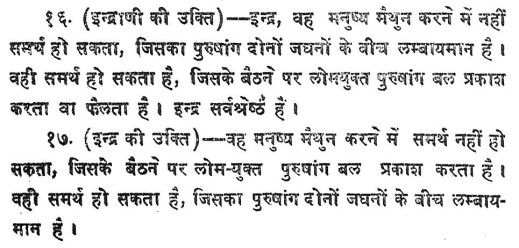
Rishi Bhauma asking for his share of women,
Rig Veda 9.67.12 This Soma juice, O glowing God, flows like pure oil, effused for thee: He shall give us our share of maids.
Stretching the Vagina
”O pregnant woman; I the physician and surgeon open your organ; Stretch the mouth of the womb; separate the embryo from arteries adjacent to it…”- Atharva Veda hymn 1.11.5, Tr. Vaidyanath Shastri (Arya Samaj)
Even if Ishwar wanted to convey a message, it would have been better for him to use some decent words, not words like only long penis penetrating deep into vagina can impregnate or I am stretching the labia of vagina. Now let’s see some more vulgar words used by Ishwar.
Yajur Veda 20.9 ”May my memory, navel, knowledge, anus, my wife’s productive womb [Yoni/Vagina], my testicles the givers of pleasure through cohabitation, my sovereignty and penis flourish…” Tr. Devi Chand (Arya Samaj)
Yajur Veda 19.76 ‘‘The generative organ [Penis] releases urine, but when it enters the womb [Vagina], it releases semen…” Tr. Devi Chand
Atharva Veda 5.25.1 ‘The phallus of man which sows the seminal fluid, lays in the female organ as feather on a shaft, the seed of embryo which is drawn from limb to limb and from cloud and heavenly region.’ Tr. Vaidyanath Shastri (Arya Samaj)
Yajur Veda 8.10 ”…O’ master of a devoted wife, full of prowess and semen, thou art the progenitor of offspring. Impregnate semen in me…” Tr. Devi Chand (Arya Samaj)
Atharva Veda 5.25.8 ”Says wife to her husband at the time of pregnation ceremony [Sexual intercourse]— O husband! please rise up, put forth your manly strength, lay the germ of embryo in the womb…” Tr. Vaidyanath Shastri (Arya Samaj)
Yajur Veda 19.87 ‘‘A husband full of semen like a pitcher, enjoyer, progenitor of children…” Tr. Devi Chand (Arya Samaj)
Yajur Veda 19.84 ”Those learned persons get progeny, who chase afar folly and ill intention, generate near at hand, by milk and medicinal juices, through generative organ, pure, disease-destroying, children-producing semen…” Tr. Chand (Arya Samaj)
Atharva Veda 12.3.29 ”…Let these drops mingle with these rices as woman sees her husband and embraces him for cohabitation” Tr. Vaidyanath Shastri(Arya samaj)
Yajur Veda 12.93 ”O married man, God has created the various herbs, whose king is Soma, that overspread the earth. With their aid, grant semen for this woman, and spread the knowledge of these medicines unto all.” Tr. Devi Chand (Arya Samaj)
Atharva Veda 6.101.1 ”O man! be strong through practice of continee, gain vitality through vital air, strengthen your body and invigorate extensively your limbs, so that the genitive organ of yours develop in proportion to your body and with that you attend your wife in sexual function.” Tr. Vaidyanath Shastri
Atharva Veda 6.101.2-3 “O man of medical science! extend the organ of the importent man like the bow with medicine through which the physicians make the debilitated man strong and stimulant and through which the ailing man excitant. I, the physician extend the potential power of your organ of generation like the bow-string on its arch, O feeble one! and you like the lion pouncing on dear enjoy the sex with your wife without being subject of any agony and discomfiture.” Tr. Acharya Vaidyanath Shastri (Arya Samaj)
Indra the Testicle breaker
Atharva Veda 6.138.2. “Turn him into a eunuch that wears his hair dressed, and into one that wears a hood! Then Indra with a pair of stones shall break his testicles both!” Tr. Maurice Bloomfield
Following is the Hindi translation by Shripad Damodar Satvalekar (Arya Samaj)

Atharva Veda 14.1.36 “Let Ashvinau, Prana and Apana adorn this bride with that sheen or splendour by whatever are filled these Akshas, the organs of body, by whatever is endowed the Sura woman having good bodily strength, by whatever is in the thigh of the woman having great sexual appetite.” Tr. Acharya Vaidyanath Shastra (Arya Samaj)
Mahanagni (Great naked woman)
Mahanagni is mentioned in Atharva Veda Kanda 20, Adhyaya 136, but due to obscenity of the hymn about size of sexual organ and ‘Big Naked Woman’ Griffith translated them in Latin.
Brhaddevata i.55 “…the harlot (mahanagni: AC. XX.136.5) would be a lascivious verse…” Tr. Arthur Anthony Macdonell
Swami Parmeshwarananda wrote,
“…the Vedic religion had developed the concept of the ‘Great naked woman’, the Mahanagni, as early as the period of the Atharvaveda (AV) some hymns from which are known to form part of the Khila hymns of the Rgveda. At one place in the AV, Mahanagni (another reading is Mahanaghni, but only at this place) is alluded to in the mantras in the context of marriage; and the gods Asvins are invoked to protect the bride by their powers by which they got sprinkled the genitals of Mahanagni (AV XIV.4, 36 yena mahanaghnya jaghanam…abhy’ asicyanta.
In the same context we have some ritual-detail; for, along with the genital of Mahanaghni, wine and the dice are also referred to have been sprinkled (Ibid. yena va sura yena aksa abhy’ asicyanta). This will indicate that the sprinkling of the genitals of the Mahanagani, together with the wine and the dice probably formed some sort of a ritual; and, very probably, it was done for prosperity; it is the ritual-belief of the propitation of this naked goddess that further entered the ritual of marriage, as a charm for the happy married life for the bride. However, the propitation of Mahanagni is not exclusively associated with marriage, it was a much wider practice, and was extended to the ritual of marriage…Mahanaangi is told that ‘he’ is roaring, being unsatisfied; she should be easy, and lift her thighs (RV-Khila V.22.6; AV XX.136.5 with variant reading). Mahanagni strides over the mortar and says, ‘As do they pound you, so do they mine’ (RV ib. 7=AV ib. 6). Mahanagni rinses the ‘cock’ with the wooden peg (TV ib.8=AV ib.10 mahannagni krakravakum samyaya pari-dhavati); and now, the singer says that he does not know, ‘the beast carries the woman by head!’ (AV ib.10 ayam na vidma, yo mrgah sirsna harati dhaninkam; RV 8 has it as, ‘This bamboo-stic (tajanam) we do not know; the woman dhanaka) becomes ‘endowed with the head’ (? sirsna bhavati dhanaka). Mahanagni says, ‘Well is the membrum virile entered; of the ‘tree having such fruit’ may we gainbasket after basket’ (AV ib.9=RV ib.5, with the difference that in RV at ab we have ‘the organ of the horse has entered’).
Then we have references to the male partner of Mahanagni, who is called Mahanagna. This is what is said: ‘Mahanagni runs after Mahanagna, who runs (or, ‘rinses’ Mahanagna who ‘rinses’ her, dhavantam anu dhavati ‘where the sense seems to be twofold, including the sexual); (and says), ‘These his cows, protected them; ‘enjoy’ me, ‘eat the moist one’ (AV ib. 11 = RV ib. 9)’, where the sense is clear, and the eating of the ‘moist one’, is to be understood with ‘enjoy me’ (yabha mam, adhhy, odanam), the whole concept being of the sexual acct as a charm for the protection of the cows…” Encyclopaedic Dictionary of Vedic Terms, Volume 1, page 355-6, by Swami Parmeshwaranand, Published by Sarup & Sons, 2000
Yajur Veda 6.14 ‘‘O disciple, through various sermons, I enjoin upon thee to purify thy voice, thy breath, thy eye, thy ear, thy navel, thy penis, thy anus ; and all thy dealings.” Tr. Devi Chand (Arya Samaj)
Yajur Veda 21.55 ”…just as God, the Dispeller of misery, like pleasure-giving water and semen-virile, invests in this world the soul…” Tr. Devi Chand (Arya Samaj)
Yajur Veda 25.1 ”…Acquire the knowledge of oozing semen from testicles…” Tr. Devi Chand (Arya Samaj)
Atharva Veda 6.72.1-2 “…so He makes the genital organ endowed with vigour of yours endowed with vigour, O man! in proportion to the stature of the one limb with other limb. As the genital organ of male made stout with the power of vital air, becomes capable of impregnation and as proportionate is the organ of well-developed man so great stout proportionately be your organ, O man of house hold life.” Tr. Acharya Vaidyanath Shastri (Arya Samaj)
Rig Veda 1.126.6-7 “She, who, when her desires are assented to, clings as tenaciously as a female weael, and who is ripe for enjoyment, yields me infinite delight. Approach me, (husband); deem me not immature: I am covered with down like a ewe of the Gandharins.” Tr. Wilson
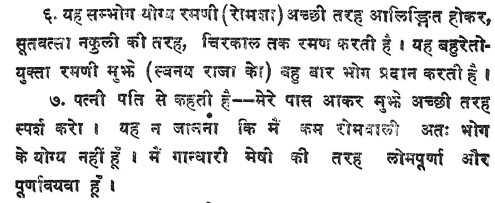
Atharva Veda 14.1.22 ”You attain a long life, not short of hundred years obeying the rules of disciplined cohabitation without spoiling the semen in vain and according to the law of Dharma play your role accompanied by sons, grandsons…” Tr. Vaidyanath Shastri
Here Ishwar is asking husband and wife to have disciplined sex i.e., they should have sex just like Ishwar has prescribed them. It is considered a sin if semen is spoiled i.e., one should not let semen fall on earth the proper place for depositing semen is Vagina only (as per Hindu texts and scholars), it is mentioned in Upanishad,
Brihadaranyaka Upanishad 6.4.4-5 ”Having known this, Uddalaka the son of Aruna, Naka the son of Mudgala and Kumaraharita said: ”Many mortals, brahmins only in name, perform the sexual act without knowledge of what has been said and depart from this world impotent and without merit.” Even if this much semen of one asleep or of one awake is spilled, He should touch it and repeat the following mantra: ”Whatever semen of mine has split on earth, whatever flowed to plants, whatever to water, I reclaim it.” With these words he should take the semen with his ring finger and thumb and rub it between his breasts or eyebrows, repeating the following mantra: ”Let the semen return to me, let Vigour come to me again, let glow and good fortune come to me again. May the deities who dwell in the sacrificial fire put the semen back in its proper place.” Tr. Swami Nikhilanda
‘If a virgin girl is married to suitable man he can tell her any thing of sexual nature that would not be treated obscene. That will be taken only as the science of sex.- Vaidyanath Shastri (Arya Samaj) on Atharva Veda book 20, hymn 133, Vol 2, p.716, Published by Arya Pratinidhi Sabha, New Delhi-2, 2003 Reprint.
Following verse says that Vedic god Varuna had become impotent whose virility was restored by Gandharva via a herb and it also has many obscene words,
Atharva Veda 4.4.1-7 “This is that herbacious plant which is dug out from the earth by a physician for the use of the man whose potency is lost. We also dig out that remedial plant which stimulates the nerves and organ. Let the dawn be stimulant, let the sun be stimulant, let our words be stimulant and let the remedial plant which is the protective force for creatures and which is most effective, be stimulant to impotent nerve with its might energy. O man! let this herb make your nerve so stronger and more stimulant that in spite of impotency your strong body and nerve be active like him who is under the fever of passion…O physician, O nourisher, O enlightened woman, O protector of knowledge! You all by your restorative efforts make the organ of the impotent man strong like the bow. O man! I, the physician by the proper remedial treatment make your genital organ strong like a bow-string tight on its bow-ends. Let you be free from agony for ever and step on in your house-hold life. O physician! You are the expert of body and limbs. Please restore into the impotent man that power which horse, ass, the goat, ram and possess in them.” Tr. Acharya Vaidyanath Shastri (Arya Samaj)
Acharya Vaidyanath Shastri’s translation is not clear, following is the much more clear English translation of Maurice Bloomfield
Atharva Veda 4.4.1-7 “1. Thee, the plant, which the Gandharva dug up for Varuna, when his virility had decayed, thee, that causest strength, we dig up. Ushas (Aurora), Sûrya, (the sun), and this charm of mine; the bull Pragâpati (the lord of creatures) shall with his lusty fire arouse him! This herb shall make thee so very full of lusty strength, that thou shalt, when thou art excited, exhale heat as a thing on fire! The fire of the plants, and the essence of the bulls shall arouse him! Do thou, O Indra, controller of bodies, place the lusty force of men into this person! Thou (O herb) art the first-born sap of the waters and also of the plants. Moreover thou art the brother of Soma, and the lusty force of the antelope buck! Now, O Agni, now, O Savitar, now, O goddess Sarasvatî, now, O Brahmanaspati, do thou stiffen the pasas as a bow! I stiffen thy pasas as a bowstring upon the bow. Embrace thou (women) as the antelope buck the gazelle with ever unfailing (strength)! The strength of the horse, the mule, the goat and the ram, moreover the strength of the bull bestow upon him, O controller of bodies (Indra)!
Pasas means penis, Acharya Vaidyanath has also translated words like penis as genital organ to make it look less obscene.
Yajur Veda 25.26 ”This perishable body made of earth, the home of all organs is created for the enjoyment of the soul. God, for the excellent enjoyment of this active soul, grants this enjoyable object.” Tr. Devi Chand (Arya Samaj)
Yajur Veda 25.7 ”…Strengthen scrotum with the testicles. Examine the strength of a horse from his penis. Produce progeny with semen. Digest meals with the force,Strengthen your belly by free discharge of digested food through anus.” Tr. Devi Chand (Arya Samaj)
Can Hindus or Aryas read these verses in front of their parents, elders or other people? Can god really use such vulgar language in the Holy Book? This might be the reason why Aryas are ill mannered, always uses foul language, and perhaps this is why they look only for porn in other scriptures. What is the wisdom behind revealing such obscene words like ”penis releases urine but when it enters the womb [Yoni] it releases semen” weren’t Aryans aware of cohabitation that Ishwar had to inspire it? The sentence of Yajur Veda 25.7 is useless now as Horses are not required. If horse’s strength was examined by his penis then how did the Aryas examine the strength of Humans? the next line says ‘Produce progeny with semen” as if people produce progeny from cooking oil. Why give such vulgar unnecessary knowledge? Such book which is no different than a porn literature can never be the word of God. Hindus should study these verses carefully instead of blindly following their scholars.
More on Obscenity in Hinduism: Hinduism and Lust
